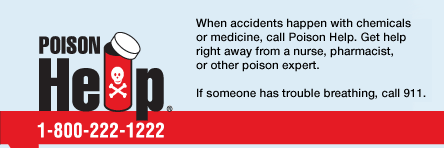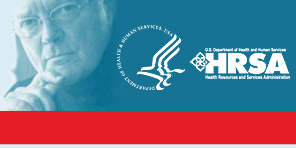

 |

|
Seasonal Tips: Fall (PDF, 136 KB) Visit the Adobe Reader Web site and follow the instructions to download the appropriate version of Adobe Reader for your operating system. POISON HELP 1-800-222-1222 PoisonHelp.hrsa.gov When accidents happen with chemicals or medicine, call Poison Help (1-800-222-1222). Get help right away from a nurse, pharmacist, or other poison expert. SEASONAL TIPS Kids are back in school. Cold-and-flu season is here. Holidays are just around the corner. Here are some tips to help you prevent poisonings during this busy time of year: Medicines • Keep medicines (as well as vitamins and diet supplements) in the containers they came in. Do this at home AND when traveling. • Lock up medicines and household products where children can't see or reach them. • Use containers that are made to keep children out. Replace caps tightly after using a product. Remember that no container can promise to keep children out. • Tell your doctor about all medicines you are taking. Mention prescription AND over-the-counter drugs. • Read and follow directions and warnings on the label before taking medicine. If you have questions about how to use your medicine, call your doctor or pharmacist. • Read the label before taking or giving medicine EVERY TIME. • Talk to your doctor before taking any food supplements (like vitamins, minerals, or herbs). • Never take medicine in the dark. • Do you have medicine you no longer need or that has expired? Get rid of medicines that have expired or are no longer needed. Ask your local pharmacist how you can return unused, unneeded, or expired prescription drugs to pharmaceutical take-back locations for safe disposal. If this is not available, take the unused, unneeded, or expired prescription drugs out of their original containers. Mix the drugs with an undesirable substance, such as kitty litter, and put them in waterproof containers, such as empty cans or sealable bags, to make sure that they are not found and used by people or animals. Throw these containers in the trash. Your poison center may have updated advice for your area, call 1-800-222-1222. • Products, like medicine, that taste, smell, or look like candy or drinks may attract children. Be sure to keep these products out of sight. Keep them out of reach and locked up. • Children learn by imitating adults. Children who see adults taking medicine will try to do the same thing. Mushrooms • Only experts can tell poisonous mushrooms from safe mushrooms. • Poisonous mushrooms, called "death caps," often grow in yards and parks. • Eating even a few bites of certain mushrooms can cause liver damage that can kill you.
• Berries may attract children. They may think these berries are just like the fruits at the food market. • Some berries that can harm people do not harm birds and other animals. • If you think someone ate one or more berries from a plant, call Poison Help (1-800-222-1222) right away. Poison center experts probably WON'T be able to identify the plant on the phone. So, before a poisoning occurs, learn the names of plants around your home. • A person at a greenhouse or plant nursery can help you identify the plant.
• Children often use glue, paint, ink, and other art products at home, school, and day-care. These art products are mixtures of chemicals. They can be dangerous if not used correctly. Make sure children use art products safely. • Art is an important part of early learning. Here are some safety tips to follow when supervising children's use of art products: - Read the label carefully. Follow directions for safe use and disposal. - Do not eat or drink while using art products. - Wash skin after contact with art products. Clean equipment. Wipe tables, desks, and counters. - Never use products to decorate food unless the product says it is safe to do so. - Keep art products in the containers they came in. Carbon Monoxide (CO) • Fall is usually the time we turn on heaters and generators. Make sure your heating system is Department of Health and Human Services |
|